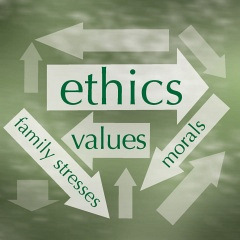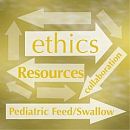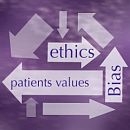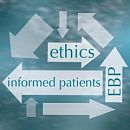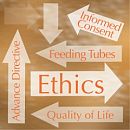Sale thru 7/31/25
Ethics, Evidence & Pediatric Decision Making #e149
Presenters: Donna Edwards, MA, CCC-SLP, BCS-S & Paula Leslie, PhD, FRCSLT, CCC-SLP
Learn an approach to help manage complex pediatric cases.
– R.J., prior course participant
Read more comments about this course!
This course will help to fill the information void on ethical decision making in the pediatric setting. When striving for autonomy and the push for clinical beneficence clash, service providers need sound advice based on current best practice. Participants will learn how ethical healthcare is based on evidence-based practice which requires patient and family input and respect of their values. This approach can be successfully applied to practice in order to better manage complex pediatric cases.
Course is offered for 0.1 ASHA CEUs – 1 Contact Hour.
Also see course, #e171 - Ethics and Pediatric Feeding and Swallowing
Course Overview – Run Time: 1:12:09
- Values, Morals and Ethics
- Evidence-Based Practice
- Patient Values and Beliefs
- Caregiver Stresses
– A.B., prior course participant
Read more comments about this course!
The content of this online CE course does not focus exclusively on any specific proprietary product or service. Presenter financial and non-financial disclosures may be found in the Presenter & Disclosures area.
Video PowerPoint presentation with author narration & downloadable handout. Stop and re-start the course at any point. Learners retain access to course content after completion for ongoing reference and review.
Reviews
"The discussion of the case examples was most beneficial." E.V. (Jun. 2025)
"Ethics in the pediatric setting was the most beneficial discussion. I liked that there were examples and discussion points." E.S. (May 2025)
"The reminders about what is included in evidence based practice were best. I thought the case scenarios were helpful." P.T. (May 2025)
"Going over evidence based practice was most useful. I like that they brought in specific examples." M.C. (Apr. 2025)
"I liked the case presentations. And defining the differences between values, morals and ethics." C.A. (Apr. 2025)
"Considering clinician bias was beneficial. I appreciated the reflection on values, morals, and ethics." A.S. (Feb. 2025)
"I really appreciated the definition and explanation of values, morals and ethics. Great reminder to really acknowledge my own values and biases. The description of evidence based practice was beneficial and appreciate that someone might have a lot of experience...it does not mean they don't need to listen and be willing to be flexible and incorporate new ideas." A.B. (Jan. 2025)
"I enjoyed the discussion regarding ethical considerations and levels of evidence. The course was engaging and interesting." E.E. (Jan. 2025)
"Good questions to ask yourself when facing certain situations with patient care and patient participation. I enjoyed the case studies and how to think about the outcomes." O.A. (Jan. 2025)
"Discussion of culture and pain was a helpful reminder that not only will patients have different views of treatment but will also have differing views of the condition itself. I liked how studies were brought from other areas to discuss clinical decision-making." M.T. (Jan. 2025)
"I liked the consideration of patient values in all decisions we make. It was helpful talking about how our recommendations are not necessarily what the patient may value." T.B. (Dec. 2024)
"Presentation of the Seedhouse Grid was helpful as it provided a helpful overview of the many things to consider when communicating with and treating a patient (and patient's family). I liked the clinical examples that were provided that further supported the information presented." W.W. (Dec. 2024)
"I found most beneficial the breakdown of ethics so I can make more organized decisions in how I apply research and approach my care with patients. I liked being able to take the test while I took the course." B.F. (Dec. 2024)
"Helpful review of Seedhouse Grid and its role in medical ethics. Clear communication, applicable case studies, and visual supports." K.B. (Dec. 2024)
"Beneficial discussion about patient's perspectives and beliefs. Also, the importance of clinicians being good communicators. I liked the instant access to the video presentation and notes." J.H. (Dec. 2024)
"I appreciated the importance of considering the patient's point of view, even if we believe that our recommendations are "correct". This course urged me to take into consideration the full picture of what the patient is experiencing, including their perspectives and values, which we might be ignoring." L.S. (Nov. 2024)
"I liked the components of EBP and the examples and diagrams." P.D. (Nov. 2024)
"Good reminder that the family's perspective is important and the need to discuss their perspective because there may be a reason for the belief or thought." L.S. (Nov. 2024)
"Going in-depth with morals and ethics was beneficial for me. I liked how the instructors provided examples for us to explore our own thoughts and rationales." A.M. (Nov. 2024)
"I liked the topic of ethics in general and considering family perspective. Convenience of being online." N.A. (Nov. 2024)
"All the information was beneficial. The course was short and sweet." R.G. (Nov. 2024)
"I liked the Venn diagram with the considerations regarding ethics." A.M. (Oct. 2024)
"This course was thought-provoking. Beneficial discussion on including families in decision-making and problem-solving when they aren't compliant with therapy." C.H. (Oct. 2024)
"Very clear and concise course. Considering patient and family dynamics and what is best for them to manage." T.K. (Oct. 2024)
"Helpful reminders of consideration of all components of EBP." C.S. (Oct. 2024)
"All topics were beneficial. I liked how the course focused on the pediatric population." J.A. (Sep. 2024)
"The Seedhouse Grid was beneficial. Helpful definitions of values, morals and ethics. The case studies were helpful, and I liked that I could take the course based on my availability." R.S. (Aug. 2024)
"I liked discussing ways to decide if a research paper is valid and applicable to my client. A variety of resources/visual images to help think about the various components of ethical decision-making." C.L. (Jul. 2024)
"The communication piece from her previous training that the quality of communication affects the patients POV, regardless of outcome, if it went 'right or wrong' was beneficial. I liked the review of Evidence-Based Practice in Ethics." A.G. (Jul. 2024)
"I enjoyed the discussion on respecting patient values and expectations. Great recording and case study examples given." K.D. (Jul. 2024)
"The Seedhouse grid model was an interesting way to look at patient consideration and ethical considerations. I liked the focus on client perspective." M.R. (Jul. 2024)
"It was beneficial to discuss cultural and personal issues that may influence implementing my recommendations. Presentation of information was clear and direct." A.C. (Jun. 2024)
"I liked the explanation of ethics, morals, and values." L.M. (Jun. 2024)
"Comprehensive definition of evidence-based practice. I enjoyed Paula Leslie's manner of presentation." S.H. (May. 2024)
"I liked the easy flow of the course and evidence-based practice." C.G. (May. 2024)
"The Seedhouse Grid for health Ethics is a valuable tool. The course was well organized and the presenters made the topics of Values, Morals and Ethics relevant with examples and specific cases." S.G. (Apr. 2024)
"Seedhouse Grid was a beneficial topic. I enjoyed the ease of following along." J.W. (Apr. 2024)
"I found the Seedhouse Grid to be a very interesting visual that very clearly depicts how we must compartmentalize so many different aspects when making clinical decisions. I enjoyed that there was a downloadable powerpoint to follow along with." A.R. (Mar. 2024)
"The explanation of the three components of evidence-based practice was helpful. I really enjoyed the Thalidomide concept about research's impact." A.I. (Mar. 2024)
"The topic of family decision making was beneficial. I liked the ease of understanding." K.C. (Feb. 2024)
"I loved the parts about personal biases - it was a good reminder." M.B. (Jan. 2024)
"The Seedhouse Grid was a beneficial topic. I liked the accessibility of the course." L.H. (Dec. 2023)
"Discussing the ASHA code of ethics was helpful. Examples of ethical problems with cases." L.V. (Dec. 2023)
"Working with families more intentionally was a helpful topic." M.Z. (Dec. 2023)
"Client perspective was beneficial. I liked the way the course was broken down." A.C. (Dec. 2023)
"I enjoyed the case studies." A.R. (Dec. 2023)
"I liked the description of what an informed clinical expert is. Well-organized information and well presented." A.H. (Dec. 2023)
"Examples of how our values, morals and social constructs impact our daily lives and can impact our clinical decision making." A.B. (Dec. 2023)
"Keeping personal bias out of therapy and the need to be flexible. Listen to your patients." S.N. (Dec. 2023)
"Beneficial discussion on personal religious beliefs affecting interactions with patients." E.G. (Nov. 2023)
"This course covered a broad range of topics. Discussed the effect of communication on a patient's perspective and clinician biases." L.L. (Nov. 2023)
"The importance of acknowledging/accepting the client/family's perspectives." J.W. (Nov. 2023)
"I liked the patient perspective and personal bias discussion. Nice charts and bullet points." L.H. (Nov. 2023)
"All content was relevant to my daily practice." S.P. (Nov. 2023)
"Discussing ethics vs. morals. vs. values was beneficial." J.D. (Nov. 2023)
"The definition of values, morals, and ethics pertaining to clinical settings was helpful." P.R. (Nov. 2023)
"The importance of the patient and family perspective. The presenters were very easy to understand." L.J. (Oct. 2023)
"Real life application of ethics on patient examples." C.F. (Oct. 2023)
"A good reminder to take parent perspectives into consideration when they are rejecting recommendations. Well outlined topic." B.N. (Oct. 2023)
"I found the case examples and explanations to be the most helpful. I liked the analysis of the research articles that were presented." A.B. (Sep. 2023)
"Brief, concise, and covered important topics. I liked the case studies." L.L. (Sep. 2023)
"The issue of compliance and whether or not to continue treatment was beneficial to discuss. Good examples and I liked the graphics which I thought were good representations of ideas." B.D. (Aug. 2023)
"I liked the provision of distinctions regarding values, morals, and ethics. The definition of Evidence-Based Practice using 3 concentric circles and the suggestion regarding continuing education in related fields was beneficial." K.M. (Aug. 2023)
"I felt everything that was addressed in this course was important. The patient or caregiver perspective is so important. I liked the overall review of the importance of ethics." J.L. (Jul. 2023)
"The presenters kept my attention, and the content was thought-provoking and informative. The discussion around patient and clinician personal bias was beneficial." K.R. (Jul. 2023)
"Understanding the perspective of the client and using both clinical expertise and client values to make clinical decisions. I liked the examples regarding patient care." L.M. (Jul. 2023)
"Engaging presenters and examples. I liked the intro about morals and values." K.U. (May 2023)
"Informative course. I liked the emphasis on consideration of the patient's point of view in addition to evidence-based practice. I liked the specific cases discussed." L.C. (May 2023)
"Clear, simple presentation. The ethical grid was beneficial." N.F. (May 2023)
"I really enjoyed the case studies. I liked the layout of this course a lot." K.Y. (Apr. 2023)
"The importance of the patient/family perspective in decision-making was beneficial. I liked the 2 charts provided, and stressing the importance of talking with patient/family to determine why they do not want to follow therapy recommendations, and the thought re: clinician noncompliance." L.M. (Apr. 2023)
"Good case studies and discussed variables that impact my decisions." A.F. (Apr. 2023)
"The presenters were informed and used personal experiences to illustrate their points. Review of research articles was beneficial." E.O. (Mar. 2023)
"I liked and appreciated thinking about ethics in our field from a broader conceptual base. This course frames concepts around ethical decision making. And thinking about evidence-based as including clinical expertise, research, and patient perspective." R.J. (Mar. 2023)
"I liked all the content." R.J. (Mar. 2023)
"Discussion of internal bias was beneficial. I liked the course length." A.P. (Mar. 2023)
"Good review of ethics and our roles as SLPs. Good examples to incorporate ethical considerations and apply information appropriately." W.S. (Feb. 2023)
"Brief course, but helpful." S.R. (Feb. 2023)
"Covered specific and important information." J.D. (Jan. 2023)
"Evidence based practice. I liked how seamless and informative this course was." K.W. (Jan. 2023)
"Course covered the application of research interpretation. And evidence based practice as it uses research evidence, the best available evidence, clinical expertise, and the patient's preferences." J.P. (Jan. 2023)
"Consideration of families. Course dipped into related fields." E.J. (Jan. 2023)
"Patient perspective. The different subtopics and discussions were beneficial." M.C. (Dec. 2022)
"Liked how in-depth the course is. I liked the seedgrid and discussion on religion. The case studies were beneficial in helping me feel more confident in what decisions I would make." S.S. (Dec. 2022)
"The importance of the patient/family perspective and clearly communicating on this was very beneficial, especially related to cases I have right now. I liked that I could take course on my own time and stop and take extra notes." K.A. (Dec. 2022)
"Course was concrete and clear. It gave me a complete understanding of the best way to be critical when facing an ethical question. It’s important to be aware of our own bias when treating clients considering the cultural diversity that we, clinicians, face during our daily practice." A.C. (Dec. 2022)
"Being reminded of caregiver stress was very helpful. Good information and easy to follow along." K.H. (Dec. 2022)
"I thought the information was presented in an organized and clear manner. The specific breakdown of values, morals, and ethics was presented in a clear manner and helped to reinforce how and why to take these into consideration when working with patients and families. I also very much appreciated the case study related to pediatric dysphagia, as I work with pediatric feeding and swallowing and have encountered similar scenarios while working with families." L.H. (Dec. 2022)
"Evidence based practice information. Excellent slides." J.W. (Dec. 2022)
"Grading of evidence with EBP and discussion regarding differences between values, morals and ethics was beneficial. I liked the importance of communication and an understanding of the patient/caregiver perspective." D.S. (Dec. 2022)
"I liked the discussion about personal bias and the recognition that there is therapist noncompliance." L.W. (Dec. 2022)
"Case study examples were beneficial." E.G. (Dec. 2022)
"I liked the ethical situations presented in the case study and the powerpoint." J.F. (Dec. 2022)
"I liked the case studies looking at a scenario and discussing the possible options. Course was relatively short and easy to follow along." D.S. (Nov. 2022)
"The seedhouse grid was quite good. The examples of specific situations and the issues were well presented." J.O. (Nov. 2022)
"The reminder that we all come with our own individual beliefs and bias, including families, and we have to respect that. A lot of good food for thought." N.M. (Nov. 2022)
"Clear Instruction." A.J. (Nov. 2022)
"Considering all the factors behind a family's belief in therapeutic services was good to learn. I liked the presenter's real-world examples." E.J. (Nov. 2022)
"Helpful handouts for the course." M.G. (Nov. 2022)
"Course content and delivery were good." A.G. (Nov. 2022)
"The discussion regarding differences between values, ethics, and morals and grading of evidence were beneficial." T.R. (Nov. 2022)
"The presenter of this topic provided information on both sides of clinical approach and research." P.G. (Oct. 2022)
"I liked learning about Seed Grid, learning at my own pace, and the ability to re-test." A.G. (Oct. 2022)
"I liked the case studies and the format." B.C. (Oct. 2022)
"Linking ethics to evidence-based practice was beneficial." L.T. (Oct. 2022)
"I found reviewing the Code of Ethics was most beneficial to me. I liked the examples provided and how you would provide them to the ethics of ASHA." S.S. (Oct. 2022)
"The presentation was engaging and on point with direct information needed." I.F. (Oct. 2022)
"I liked the discussion regarding evidence based practice and the informed clinical expert." M.M. (Oct. 2022)
"Practical real-life examples, including speech and medical field." K.L. (Oct. 2022)
"I appreciated how evidence-based practice was defined with 3 components." A.M. (Sept. 2022)
"The course is easy to understand and apply to best practice." A.P. (Sept. 2022)
"Learning the 3 components of evidence-based practice was helpful. I liked the handouts. The discussion was easy to follow and add notes from the talking points." T.H. (Sept. 2022)
"I like how it defined the differences between morals, values, and ethics." K.B. (Sept. 2022)
"The topic of working to take into account the family's perspective and how that is influenced by what is going on in their lives was beneficial." S.V. (Sept. 2022)
"I liked that it was easy to understand and was informative." A.C. (Sept. 2022)
"I liked the case study examples." G.N. (Sept. 2022)
"The information on the differences and interactions between ethics, values and morals was beneficial for my practice." C.S. (Sept. 2022)
"The topic of morals verses ethics is always interesting to me." J.P. (Aug. 2022)
"I liked the examples. The print outs are handy and will be easy to reference later." D.M. (Aug. 2022)
"I liked the importance of better understanding the caregivers' perspectives in different situations and the importance of effective communication." K.T. (Aug. 2022)
"The Seedhouse grid is an interesting framework that I had not previously heard of." A.W. (Aug. 2022)
"Good reminder to use evidence based research to incorporate into clinical decision making. I liked the flexibility to view course on my own time." L.C. (Aug. 2022)
"The Seedhouse grid was helpful for guiding decision making. I enjoyed the information about evidence and clinical decision making." L.K. (Aug. 2022)
"I liked the diagram indicating the three aspects of evidence based practice. I liked that I could watch this course at any time." C.G. (Aug. 2022)
"I liked that it talked about more than evidence based practice." N.T. (Aug. 2022)
"I liked the topic of how research is valuable and that we have to also think about clinical judgment and patient values." A.K. (Aug. 2022)
"The course is self-paced and easy to follow along with." I.T. (Aug. 2022)
"The speakers were engaging." M.S. (Aug. 2022)
"I appreciated the well-organized and effective collaboration between the presenters regarding a critically important topic." A.M. (Aug. 2022)
"The emphasis on communication with parents and family members, in order to determine families' values and stressors and how those influence plans of care, struck me as important. I liked the individual case studies and sets of choices." J.M. (July 2022)
"I enjoyed the graphics that helped visually explain how to make ethical decisions within this field. I liked that it was self-paced and included visuals." E.R. (July 2022)
"I like the inclusion of case presentations to reinforce the importance of decision making." S.D. (July 2022)
"Very applicable to everyday patient care." R.J. (June 2022)
"I found the discussion of the importance of understanding and respecting the views of patients and their families most beneficial. I liked the Venn Diagram showing the intersection of: best available evidence; informed clinical expertise; and patient’s values and expectations." S.C. (June 2022)
"Learning the importance of balancing the professional's and the patient's/family's perspectives, and discussing differences between values, morals, and ethics were all helpful." C.R. (June 2022)
"I liked the individual case studies and how to navigate those ethically. It was a nice refresher on ethical practices." L.W. (June 2022)
"The idea of taking into consideration the cultural, economic, and individual perspectives of the family before imposing own judgements about compliance to treatment - course was easy to access." J.H. (June 2022)
"I enjoyed learning about the Seedhouse grid and reviewing EBP." L.H. (May 2022)
"Discussing values, morals, and ethical considerations were very relevant to practicing as a clinician. The case studies were relevant to the outline of the course." C.R. (May 2022)
"Keeping the family's unique perspective of the problem/illness in consideration when therapy becomes difficult will be beneficial to my practice. The presentation was thoughtfully communicated." K.H. (May 2022)
"The topic of values, ethics and morals and leaving our bias at the door was beneficial. I liked being able to review information and the pace of the information presented was good." R.G. (Apr. 2022)
"Ethics in real situations – the course was informative and appropriate in length." S.R. (Apr. 2022)
"Stressed the importance of patient perspective." J.H. (Apr. 2022)
"I liked the review of best practice with real-life examples, and the discussion about how caregiver/family circumstances affect how much information they can receive and how they will receive it." C.B. (Mar. 2022)
"How personal bias affects clinical practice was beneficial. I liked the ease of access to the course." H.P. (Feb 2022)
"I appreciated the thought-provoking examples to prompt me to approach some clinical situations a little differently now. I really enjoyed Dr. Leslie's real-life examples and connections she offered." G.T. (Jan. 2022)
"Listening to and understanding a patient and family's point of view and working as a team toward a common goal. I liked the breakdown of the different types of research." C.S. (Jan. 2022)
"The importance of open communication. Course was easy to connect with and to follow." J.S (Jan. 2022)
"The need to consider level of families' stress and understanding. Being aware that a family agreeing readily and going along does not always mean they have good understanding of the situation." K.L. (Jan. 2022)
"It was brief, to the point with clear explanations, good graphics and good clinical examples." K.L. (Jan. 2022)
Course Objectives
- Describe the differences between values, morals, and ethics.
- Describe the link between ethics and evidence-based practice.
- List caregiver stresses.
Northern Speech Services is an AOTA Approved Provider of professional development. PD activity approval
ID#23077.
This DL-Independent activity is offered at 0.1 CEUs,
Intermediate, 1. Domain of OT: Client Factors: Values, Beliefs and Spirituality
2. Professional Issues: Issues and Trends: Ethics; Evidence-based practice. The assignment of AOTA CEUs does not imply
endorsement of specific course content, products, or clinical procedures by AOTA.
Presenter & Disclosures
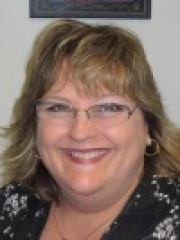
Donna Edwards, MA, CCC-SLP, BCS-S, is an author, inventor, national/international speaker and Board Certified Specialist in Swallowing and Swallowing Disorders at Dayton Children's Hospital where she serves an inpatient/outpatient pediatric population and trains students/colleagues in clinical care. Upon graduating, she worked with children and adolescents in the school system, including working along with the national autism teacher of the year. After several years, she relocated to Ohio and began working with adults in extended care facilities before working as the Dysphagia Coordinator at a Level I Trauma Hospital while treating patients in acute care and on the Head Injury, Spinal Cord Injury, and CVA rehab teams. She has served patients from the ages of 103 years old to premature infants. Serving as the Director of Legislative Advocacy for the Ohio Speech, Language and Hearing Association (OSLHA) she advocated legislatively for patients and families impacted by communication, hearing, and swallowing disorders. She now serves as President for her state association. On The American Board of Swallowing and Swallowing Disorders, she serves as Chair of the Mentorship Committee and as a member of the Application Committee. She is past Editor of ASHA SIG 13 Perspectives and currently sits on the ASHA Governmental Relations Public Policy Board. She was awarded the honor of Elwood Chaney Outstanding Clinician Award in 2009, the honor of Fellow of the Association for her state association in 2013 and the honor of ASHA Fellow was bestowed in 2014. She has a patent pending for a jaw function measurement apparatus. She is an author of the free educational coloring book to reduce choking risk in the pediatric population entitled, Chewing Can Be Tricky.
Speaker Disclosures:
Financial — Donna Edwards is employed by Dayton Children's Hospital; receives a salary.
Financial — Donna Edwards is a presenter of online CE courses sponsored by Northern Speech Services; receives royalties.
Nonfinancial — Donna Edwards is a Board Member for the ASHA Government Relations Public Policy Board (2015-2018).
Nonfinancial — Donna Edwards is the Vice President of Association Management for OSLHA (2014-2017) and President-Elect (2016-2019).
Nonfinancial — Donna Edwards was the Past Editor for ASHA SIG 13 Editorial Committee (2012-2015) and is Swallowing Disorders Executive Committee Member-Secretary-Mentor Committee Liaison-Co-Chair of the Continuing Education Committee (2011-2016).
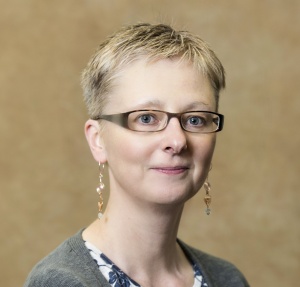
Paula Leslie, PhD, FRCSLT, CCC-SLP, is a professor and director of the Doctor of Clinical Science in Medical Speech-Language Pathology. She maintains full clinical licenses in the USA and UK where she is a Specialist Adviser to the Royal College of Speech & Language Therapy in swallowing disorders. She provides support to researchers and provides continuing education from grassroots to international level and across the health professions on complex clinical decision making, ethics, and end of life decisions in vulnerable populations. Her honors include the Honors of the Association Southwestern Pennsylvania Speech-Language-Hearing Association, the American Speech-Language-Hearing Association DiCarlo Clinical Achievement Award, the Pennsylvania Speech-Language-Hearing Association Clinical Achievement Award, and Fellow of the Royal College of Speech & Language Therapists (UK).
Speaker Disclosures:
Financial — Paula Leslie is a presenter of online CE courses sponsored by Northern Speech Services; receives royalties.
Nonfinancial — Paula Leslie has no relevant nonfinancial relationships to disclose.
Intended Audience / Accreditation

This program is offered for 0.1 ASHA CEUs (Intermediate Level; Professional Area).

Intended Audience
- Speech-Language Pathologists
- SLPA
ASHA CEUs:
Northern Speech online courses are registered with ASHA and are offered for ASHA CEUs. The number of ASHA CEUs is noted above. Note that 0.1 ASHA CEU = 1 contact hour = equals 1 CEE.
Earning ASHA CEUs and the ASHA CE Registry:
To earn CEUs from this course and have ASHA CEUs submitted to the ASHA CE Registry, course participants must satisfy each of these requirements:
- Participants must meet the eligibility requirements to earn ASHA CEUs (see below).
- Participants must indicate – prior to course completion – their intent for Northern Speech to submit this course to ASHA.
- Participants must complete/view this course in its entirety.
- Participants must complete the course post test with a minimum of 80% accuracy.
- After successful completion of the post test and completion of the course evaluation, a certificate of course completion is presented to the participant electronically via PDF.
- For those participants who indicated their intent for the ASHA CE Registry, course completion status will be submitted by Northern Speech to ASHA within 45 days of the course completion date.
Eligibility To Earn ASHA CEUs:
Attendees must meet at least one of the following conditions in order to be eligible to earn ASHA CEUs:
- Current ASHA Member.
- ASHA Certificate of Clinical Competence (CCC) Holder.
- Licensed by a state or provincial regulatory agency to practice speech-language pathology (SLP) or audiology.
- Credentialed by a state regulatory agency to practice SLP or audiology.
- Credentialed by a national regulatory agency to practice SLP or audiology.
- Engaged in a Clinical Fellowship under the supervision of an individual with their ASHA CCC.
- Currently enrolled in a master's or doctoral program in SLP or audiology.
If an attendee is not an ASHA member or CCC holder but meets any of the above criteria, they may inform the ASHA CE Registry of their eligibility by visiting this site.
ASHA CE Registry:
During the enrollment process, if you select to receive ASHA credit for this course and if you provide your ASHA number, Northern Speech will automatically submit your CEU information to the ASHA CE Registry after successful course completion (80% on post test). This submission happens once per month, during the first week of the month. For example, if you complete your course on November 7th, Northern Speech will submit all November online course CEUs to ASHA during the first week of December. When ASHA inputs the information into their database, they will mark the course as completed on the last day of the month in which it was completed, so November 30th using this example. The certificate of completion available for you to print immediately, however, will reflect the actual completion date, November 7th in this example. Due to ASHA processing procedures please allow 2-3 weeks, from the submission date, for the course to appear on your ASHA transcript.
Licensing Boards: Most state licensing boards DO accept CEUs earned online (usually classified as home-study credits). Some state boards do, however, place a limit to the number of credits that can be earned via home study/online courses. For the most current information, we suggest that you contact your licensing board or agency to verify acceptance policies and/or any credit limits related to home-study courses prior to registering for this course.
Additional accrediting agencies by which Northern Speech is an approved CE provider:
- California: NSS is approved as a provider of continuing education by the California Speech-Language Pathology & Audiology Board. Provider #PDP4. Online CEU limits may apply; please contact SLPAHADB for current online CEU acceptance policies.
- Iowa: NSS is approved as a provider of continuing education by the Iowa Board of Speech Pathology and Audiology Examiners. Provider #169.
- Kansas: NSS is approved as a provider of continuing education by the Kansas Department of Health and Environment. Provider #LTS-S0005.
Frequently Asked Questions
Customer Support: Please phone 888.337.3866 or email info@northernspeech.com.
Course Completion Timeframe:
You have unlimited time to complete our online courses. You may log off and log on as often as you’d like to in order to complete all sections of a course.
However, completion dates are based on Eastern Standard Time. Therefore, if you need your CEUs by a certain date, be sure to complete the course test before 11:59pm EST on that date. For example, if you need CEUs before January 1st, you will need to complete the course test before 11:59pm EST on December 31st.
Content Access:
Access to course materials and content does not expire, even after completing the post test. You may continue to review course material by logging into your NSS account, clicking the My Online Courses tab, and then viewing your desired course.
Certificate of Completion:
On successful completion of the post test (80%), a certificate will be immediately available for download and/or printing. This certificate will include your name, date of completion (based on Eastern Time Zone, USA/Canada), and number of contact hours (CEUs / CEEs). Please note that CEUs are awarded on the date of successful test completion, not the date of course enrollment. Please ensure that you successfully complete the post test prior to any licensure renewal dates.
ASHA CE Registry Submission:
During the enrollment process, if you select to receive ASHA credit for this course and if you provide your ASHA number, NSS will automatically submit your CEU information to the ASHA CE Registry after successful course completion (80% on post test). This submission happens once per month, during the first week of the month. For example, if you complete your course on November 7th, NSS will submit all November online course CEUs to ASHA during the first week of December. When ASHA inputs the information into their database, they will mark the course as completed on the last day of the month in which it was completed, so November 30th using this example. The certificate of completion available for you to print immediately, however, will reflect the actual completion date, November 7th in this example. Due to ASHA processing procedures please allow 2-3 weeks, from the submission date, for the course to appear on your ASHA transcript.
Purchase Orders:
Purchase orders are currently not accepted for online orders, if you wish to submit a purchase order please do so at info@northernspeech.com or fax to 888-696-9655.
What is an Online Course?
Our Online Courses consist of video, audio, and/or text content and are offered for ASHA CEUs. Unlike a webinar, which requires participants to be logged on and at a computer at specific times, our Online Courses are available to you at any time, from any device, via your NorthernSpeech.com online account. You may work at your own pace and start and stop your course as you wish. Your course will conclude with a short post test. On successful completion of the post test (>80%), a printable certificate of completion is presented to you.
Receiving CEUs:
Northern Speech is an ASHA CE Provider and our online courses are registered with ASHA and offered for ASHA CEUs. Please note that successful completion of the online post test is required prior to the awarding of CEUs. Please contact your state licensing board for acceptance policies related to CEUs earned online. Please note that courses offered for university students are not applicable for CEUs.
Registering for an online course:
You may browse all online courses by clicking the Continuing Education tab above, then Online Courses. Once you find a course, click Enroll Now, and you will be asked to either log into your existing Northern Speech account or create a new online account. Once you’ve entered your account information and provided your credit card payment, your course will be immediately available to you.
Accessing your purchased course or returning to a purchased course:
You will be able to access your online course by logging into your Northern Speech account and then clicking the My Online Courses tab on your profile screen. Click the course you would like to start or to resume. From there, proceed through the course sections until you are ready to complete the post test. You do not have to complete your course all at once. You may log on and off as you wish.
Testing requirements:
Each online course concludes with a post test consisting of multiple choice or true & false questions. Scores of 80% or greater are required for successful course completion and awarding of CEUs. You may revisit course materials and retest as needed to achieve a passing score.
Number of CEUs offered:
We offer courses from 1 to 21 contact hours. Each course will note the number of CEUs offered. Please note that 0.1 CEU = 1 contact hour = 1 CEE.
State licensing boards and online CEUs:
NSS is an ASHA CE Provider and most state licensing boards DO accept ASHA CEUs earned online (usually classified as home-study credits). Some boards do, however, place a limit to the number of CEUs that can be earned via home study/online courses. For the most current information, we suggest that you contact your licensing board or agency to verify acceptance policies and/or any CEU limits related to home-study courses prior to enrolling in an online course.
Course formats:
Our course formats include: text, audio, video, and PowerPoint with author narration. Each course will note the format on the course description page. Most courses include closed captioning.
Course handouts:
Most of our online courses provide a link to download the accompanying handout as a PDF file.
Group discounts:
Groups of 3 or more are eligible for a 20% discount on each registration on most of our online courses. To receive this discount, registrations need to be processed together via the "Group Rates" tab on the Online Course of your choice.
Computer requirements:
For our online courses to function best, we recommend that you update your computer to include the newest version of your Internet browser (Safari, Chrome, Firefox, Edge, Internet Explorer, etc.) and newest version of your computer's operating system. Also a high-speed Internet connection is recommended (cable or DSL). Speakers or headphones will be required for many of our courses as many contain audio components.
Course Cancellation Policy:
A purchased online course can be exchanged, refunded, or transferred to another individual if contact is made with NSS (via phone or email) within 30 days of purchase and the course materials have not been viewed or downloaded.
Special Needs:
Please click here for any special needs requests, and we will do our best to accommodate them.
| Contact Us |

